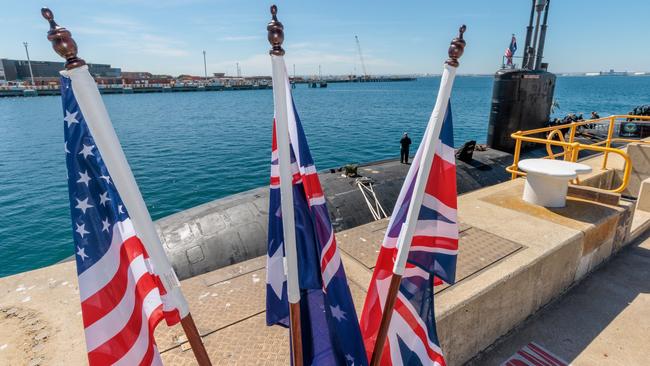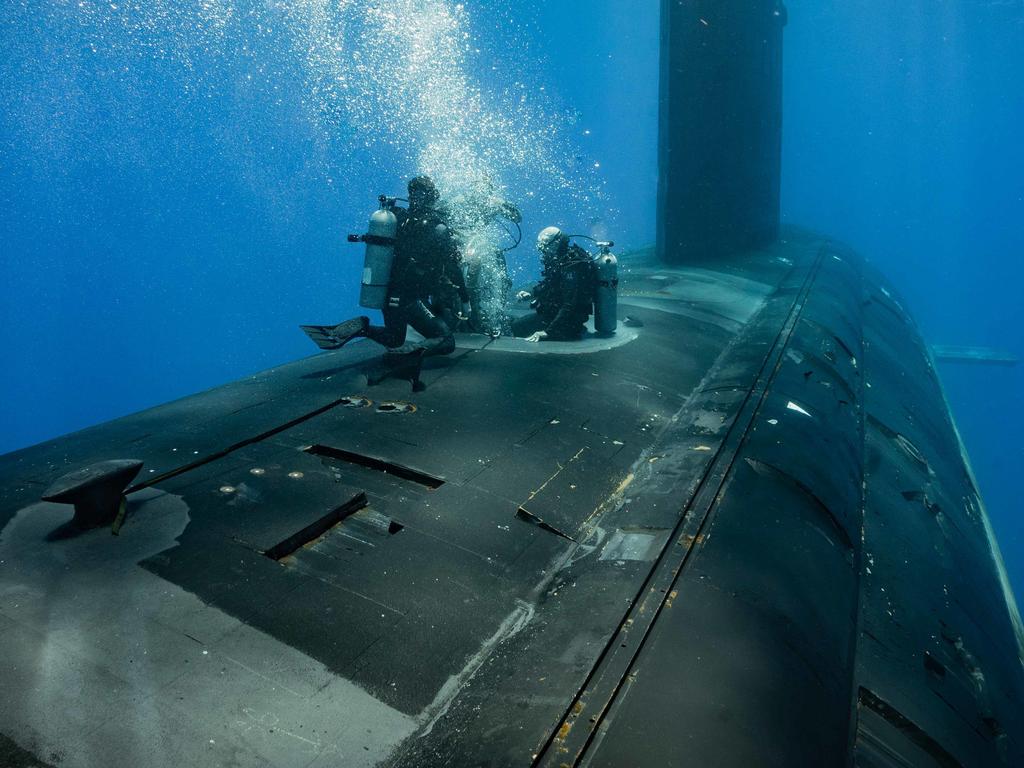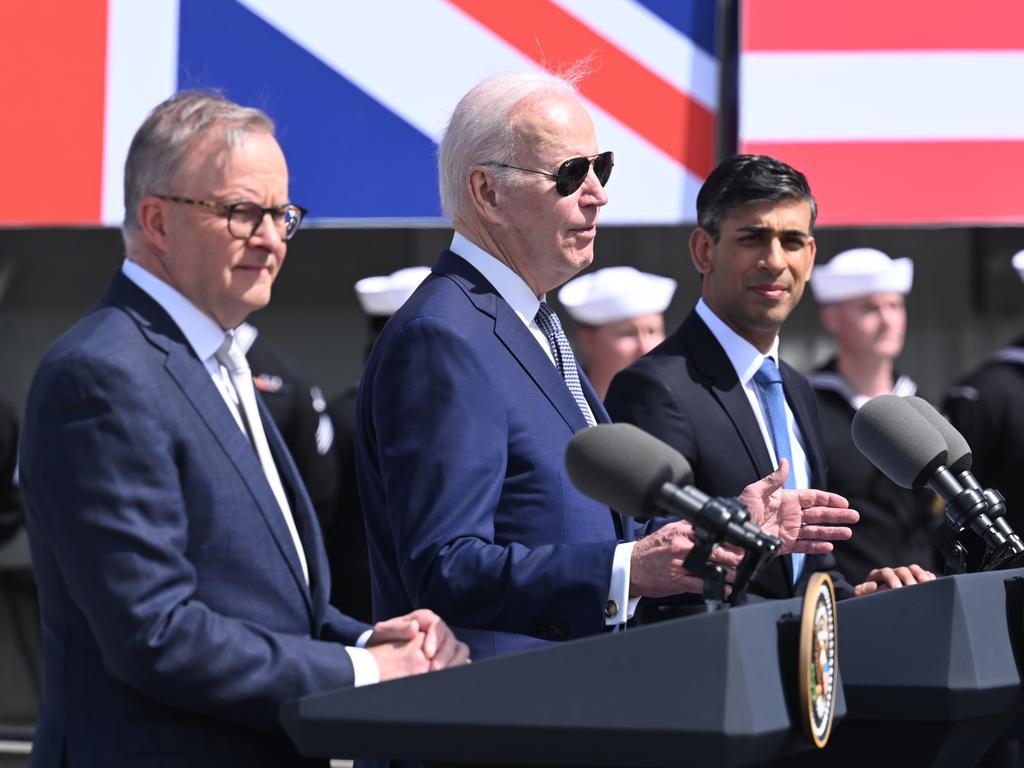Labor’s heated policy debate over AUKUS may go nuclear
Disagreement over AUKUS is likely to cause fireworks at the ALP national conference in Brisbane in August.

Between August 17 and 19, delegates will come together at the Brisbane Convention Centre – with Labor in office federally and in all states except Tasmania. The party has not been so dominant since the early years of Kevin Rudd’s government a decade and a half ago.
In the modern era, the ALP has favoured national conferences which allow for open public debate, even when the party is in office. There is sure to be some disagreement, driven primarily but not exclusively from the party’s left, over economic and social policy. However, it seems that disagreement will be most heated in the area of defence and foreign policy. Particularly with respect to AUKUS – officially titled the Australia-United Kingdom-United States Nuclear-Powered Submarine Pathway.
From an Australian perspective, AUKUS was initiated by Scott Morrison’s Coalition government, in which Peter Dutton was defence minister. The story is well told in Paul Kelly’s Morrison’s Mission: How a beginner reshaped Australian foreign policy (Penguin, 2022). Labor embraced AUKUS both in opposition and now in office.
Not so long ago, the ALP would be depicted as a two-Carr party – with a modern vehicle and a somewhat clapped out reserve in the driveway. There was Bob Carr of the Labor Right – who was to become a long-time NSW premier. He was a vehement anti-communist and a strong supporter of the Australian-American Alliance. And there was one-time senator Kim Carr, a prominent hold-over of the Victorian socialist Left. He was critical of the alliance.
The name “K. Carr” appears as a signatory of an advertisement which appeared in the September 13-18, 1976 edition of the left-wing National Times weekly newspaper. It was headed “For an Independent and Non-Aligned Australia”. Fellow signatories included such well-known communists as Eric Aarons, Laurie Carmichael and Ralph Gibson as well as such prominent leftists as Jim Cairns, Bill Hartley, Jean Melzer and Arthur Gietzelt.
For the record, a certain “R.J. Hawke” appeared on the list even though Bob Hawke was never a member of Labor’s Left faction. At the time, Hawke was secretary of the ACTU but looking to rally the comrades with a view to entering federal parliament.
The formation of the Australian-American Alliance goes back to the time of the Pacific War following Japan’s attack on the US naval base at Pearl Harbor in December 1941. It was formalised in the ANZUS (Australia, New Zealand, United States) Treaty of 1951. But Australia enjoyed close relations with the US during the prime ministerships of Joseph Lyons and Robert Menzies in the 1930s and early 1940s.
The Labor government headed by Hawke and Paul Keating in the 1980s and 1990s enjoyed good relations with the Oval Office. This was not always the case with Gough Whitlam’s government between late 1972 and late 1975 – but this was a short-lived administration. The alliance also worked well during the prime ministerships of Malcolm Fraser, John Howard, Kevin Rudd and Julia Gillard, and the Coalition governments that followed. And then along came AUKUS.
Prime Minister Anthony Albanese, Foreign Minister Penny Wong and Defence Minister Richard Marles have adapted well to their AUKUS inheritance. All three understand the importance to Australia of secure sea and air lanes. And they accept that nuclear-powered submarines envisaged, by AUKUS, will assist the process.
Labor’s leading trio also recognise the advantages of technology-sharing which will come about as a result of Australia’s enhanced co-operation with the US and Britain. But not all of the labour movement is happy. On March 15, Keating released a statement on AUKUS to the National Press Club before taking part in a soft interview with NPC president Laura Tingle.
The key takeout from this vehement performance was Keating’s reference to AUKUS as “the worst international decision by an Australian Labor government since the former Labor leader, Billy Hughes, sought to introduce conscription” during World War I.
In recent times, Keating has been supported by other one-time Labor ministers. Peter Garrett tweeted out a petition calling for a parliamentary inquiry into the AUKUS deal. It was initiated by the left-wing Australia Institute. In doing so, the former Midnight Oil singer described AUKUS as “the stinker deal of the century so far”.
Fellow signatories include former Keating government minister Carmen Lawrence plus three Greens senators. Former foreign minister Gareth Evans has joined the anti-AUKUS chorus. And Bob and Kim Carr have formed an anti-AUKUS unity ticket.
As Lydia Lynch reported in these pages last Saturday, at its recent conference the ALP’s Queensland branch voted down a motion moved by the Australian Workers Union Right congratulating the Albanese government for its support for AUKUS and the jobs that are promised to flow from it. The margin was 229 not in favour to 140. This vote illustrates the fact the ALP in Queensland has moved to the left recently.
It’s likely that the Albanese government’s stance on AUKUS will prevail at Labor’s national conference in Brisbane. But it’s also possible that there will be a robust exchange between some of the delegates – especially since sections of the trade union movement are opposed to Australia acquiring nuclear-powered submarines.
The last time an ALP national conference had a big row on foreign policy occurred in March 1963 when the majority of delegates agreed to support the Menzies government’s decision to establish an Australia-US communications base at North West Cape in Western Australia. In those days, Labor’s leaders were not delegates at national conferences – and parliamentary leaders Arthur Calwell and Gough Whitlam were photographed outside the conference waiting for delegates to decide Labor’s foreign policy.
Menzies branded the ALP delegates as the “faceless men” and Labor’s cause was set back for years. It’s unlikely that events in Brisbane will be as significant or interesting – but the tone of the debate will be important.
Gerard Henderson is executive director of the Sydney Institute.








For followers of national politics who have become somewhat bored with the familiarity of policy disputes inside the Liberal Party, August in Queensland might provide some light relief. This is the timing and location for the Australian Labor Party’s 49th national conference – the first to be held in person since the onset of Covid-19.